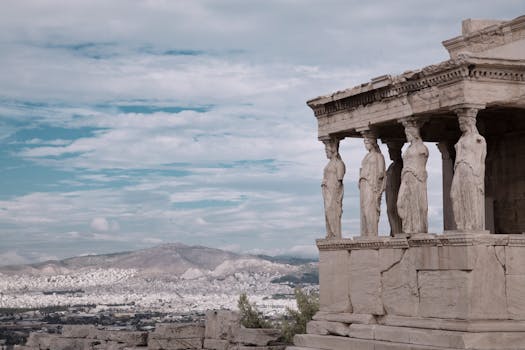Historical Sites of Ancient Greece

Ancient Greece, with its storied past and monumental contributions to civilization, is a treasure trove of historical sites that offer a window into the distant past. From the birthplace of democracy to the cradle of Western philosophy, these ancient landmarks are not just remnants of a bygone era but are living testaments to human achievement and cultural evolution. This article explores some of the most significant historical sites in Ancient Greece, each with its unique story and significance.
The Acropolis of Athens
The Acropolis, perched high above the city of Athens, is arguably the most iconic symbol of Ancient Greece. Dominated by the Parthenon, a temple dedicated to the goddess Athena, the Acropolis served as a religious and ceremonial center. The Parthenon itself is an architectural marvel, showcasing the Doric order and intricate sculptures that have influenced countless structures worldwide.
Constructed during the Golden Age of Athens under the leadership of Pericles, the Acropolis reflects the city's zenith in art, philosophy, and democracy. Visitors can also explore other significant structures on the Acropolis, such as the Erechtheion, famous for its Caryatid Porch, and the Temple of Athena Nike.
The preservation efforts for these structures are ongoing, with organizations like UNESCO recognizing their global cultural importance. The site remains a focal point for understanding classical architecture and ancient Greek religion.
Delphi: The Navel of the World
Located on the slopes of Mount Parnassus, Delphi was considered the center of the world in ancient Greek mythology. The Oracle of Delphi was one of the most important oracles in Greece, where people from all over would come to seek guidance from Pythia, the priestess who served as the oracle.
The site includes several key structures such as the Temple of Apollo, where Pythia delivered her prophecies. Other notable ruins include the ancient theater that hosted various musical competitions and plays during festivals dedicated to Apollo.
A visit to Delphi offers not only a glimpse into religious practices but also an understanding of how mythology intertwined with daily life in Ancient Greece. The site provides breathtaking views and an atmosphere that evokes its mystical past.
Olympia: Birthplace of the Olympic Games
Olympia is another cornerstone of Greek heritage, known primarily as the birthplace of the Olympic Games. Held every four years in honor of Zeus, these games were a unifying event for all Greek city-states despite their frequent conflicts.
The archaeological site includes the ruins of various sports facilities like the stadium and gymnasium, as well as temples dedicated to Zeus and Hera. One standout feature is the massive statue of Zeus that once stood in his temple, considered one of the Seven Wonders of the Ancient World.
Today, Olympia continues to be synonymous with athletic excellence and international unity. The Olympic flame is still lit here before every modern Olympic Games, connecting our present-day traditions with their ancient origins.
Mycenae: The Realm of Agamemnon
Mycenae holds immense historical significance as it was one of the major centers of Greek civilization during the late Bronze Age. According to myth, it was ruled by King Agamemnon during the Trojan War.
The archaeological finds at Mycenae include impressive structures like the Lion Gate—an iconic symbol with two lionesses flanking an altar—and royal tombs such as the Treasury of Atreus. These finds provide valuable insights into Mycenaean architecture and burial practices.
The site's importance extends beyond mythological tales; it played a crucial role in early Greek history and set many foundations for later Hellenic culture. UNESCO has recognized Mycenae's universal value by designating it a World Heritage Site.
Epidaurus: Sanctuary of Asclepius
Epidaurus was renowned in antiquity as a healing center dedicated to Asclepius, the god of medicine. People from all over Greece would visit Epidaurus seeking cures for various ailments through rituals that combined medical treatments with spiritual practices.
The site features several notable constructions including a large theater known for its exceptional acoustics—a testament to ancient Greek engineering skills. This theater still hosts performances today during the annual Epidaurus Festival.
In addition to medical facilities like baths and dormitories where patients stayed while receiving treatments, there are also temples and other religious buildings reflecting Epidaurus' dual role as both a medical sanctuary and religious hub.
| Site | Key Features | Significance |
|---|---|---|
| The Acropolis | Parthenon, Erechtheion | Cultural and Religious Center |
| Delphi | Temple of Apollo, Ancient Theater | Religious Oracle Center |
| Olympia | Stadium, Temple of Zeus | Birthplace of Olympic Games |
| Mycenae | Lion Gate, Royal Tombs | Bronze Age Civilization Center |
| Epidaurus | Theater, Healing Center Facilities | Medical Sanctuary |
These sites are not just tourist attractions; they are active fields for archaeological research that continuously yield new discoveries. Institutions like The British School at Athens conduct extensive research projects aimed at uncovering more about these ancient cultures (bsa.ac.uk). Such efforts ensure that our knowledge about Ancient Greece keeps expanding. Exploring historical sites in Ancient Greece offers invaluable insights into human history and culture. Whether it's marveling at architectural feats at The Acropolis or contemplating philosophical ideas at Delphi's Oracle, these places connect us with our shared heritage while enriching our understanding of human civilization's journey through time.